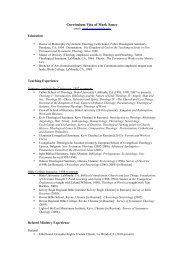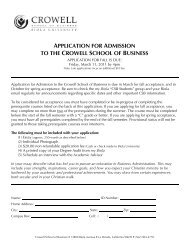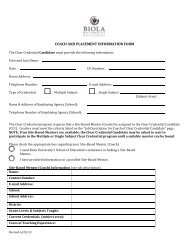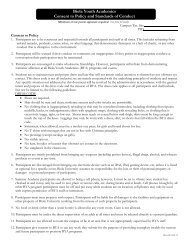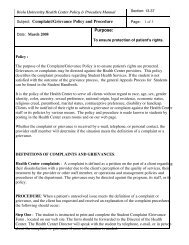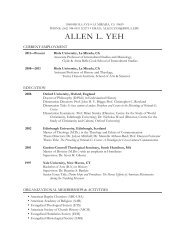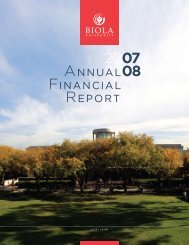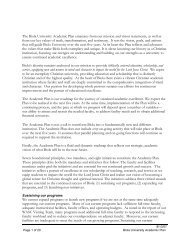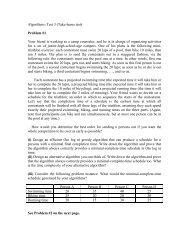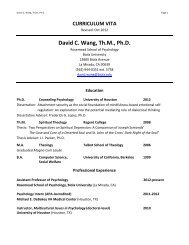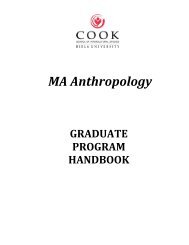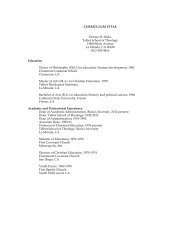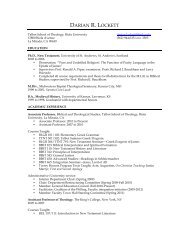Create successful ePaper yourself
Turn your PDF publications into a flip-book with our unique Google optimized e-Paper software.
ation requirements. May be repeated with a different topic up<br />
to a maximum of 6 units.<br />
orld 310 The Leader & Wisdom ............................................................2<br />
This course examines biblical concepts related to human<br />
relationships and interpersonal communication. Attention is<br />
given to human beings as designed and created by God, the<br />
consequences of the fall, and the impact of redemption. Case<br />
studies and student experiences are discussed.<br />
orld 330 Theology & the Christian Life ..............................................3<br />
A consideration of God’s Person, existing as one God, yet<br />
manifested in three Persons, and the believer’s responsibil-<br />
ity to the Church, Christ’s body, and the world at large as an<br />
agent of reconciliation in God’s kingdom program in the end<br />
times.<br />
orld 340 Group & organizational Behavior .....................................3<br />
Being the first module of the program, it is appropriate that<br />
this course center upon the many facets of working effectively<br />
within the small-group setting as one understands what it<br />
means to “think Christianly” in the workplace. After an exami-<br />
nation of one’s own leadership style, the student will begin to<br />
grasp the importance of the process vs. the content in what is<br />
shared by group members, coupled with the power of good<br />
problem-solving methods. As we examine the “power” of the<br />
small group vs. the individual, the class will lastly become<br />
exposed to many of the processing tools used when in a small<br />
group setting. Fee: $40.<br />
orld 350 management information systems ..................................3<br />
Students become acquainted with contemporary information<br />
systems technology, and explore management techniques<br />
and strategies which, combined with technologies, produce<br />
effective solutions to organizational problems. Personal com-<br />
puter skills are also enhanced.<br />
orld 360 statistical methods and research .....................................3<br />
Problem analysis and evaluation techniques are presented.<br />
Students are shown methods for defining, researching, analyz-<br />
ing, and evaluating problems they would solve in their work<br />
environment. Specific statistical information covered in the<br />
course includes identifying and measuring objectives, collect-<br />
ing data, working with significance levels, analyzing variance,<br />
and constructing questionnaires.<br />
orld 370 interpersonal Communication ...........................................3<br />
Study of how communication and relationships contribute to<br />
productive work environments. Effective personal and social<br />
relationships are also investigated through readings and ex-<br />
ercises concerning non-verbal feedback, anger management,<br />
and conflict resolution.<br />
orld 380 managerial accounting ........................................................3<br />
An overview of financial tools available for management<br />
decision-making. Major course components include income<br />
statements, balance sheets, cash flow, budgets, changes in<br />
financial position and ratio analysis. Emphasis is on reading<br />
and understanding accounting documents rather than upon<br />
their preparation.<br />
orld 390 independent study ............................................................ 1–8<br />
Portfolio-based assessment of advanced college-level<br />
technical and professional training that reflects theory, data<br />
collection and analysis, and application such that it advances<br />
student mastery of the principles and practices of organiza-<br />
tional leadership. Both 290 and 390 may be repeated for a<br />
combined maximum of 30 units.<br />
orld 4<strong>07</strong> managerial marketing ...........................................................2<br />
The student will be introduced to fundamental elements<br />
of modern marketing with an emphasis on the marketing<br />
environmental framework and the ethical use of marketing<br />
mix variables.<br />
orld 410 The Leader & Decision making ...........................................2<br />
This course examines biblical principles and ethical values<br />
related to organizational leadership. Fundamental moral prin-<br />
ciples and cultural expressions are analyzed and the biblical<br />
basis for values and morality is studied. Case studies empha-<br />
size the relationship of God and man in regard to professional<br />
and personal ethical choices.<br />
orld 430 human resource management .........................................3<br />
Students will explore the key elements of human resource<br />
management from the perspective of the “line manager”<br />
on the job. In starting the module, the key focus will be<br />
on integrating biblical themes and principles with people<br />
problems on the job. Once the biblical themes have been<br />
presented, students will gain a “hands-on” understanding of<br />
the California and federal labors laws regarding discrimination,<br />
selection, compensation, performance, discipline on the job,<br />
and termination, while continually reflecting on the concept<br />
of “thinking Christianly” in the workplace. Fee: $40.<br />
orld 440 Principles of management & supervision ......................3<br />
Students will study the nature of management principles and<br />
their application through the use of biblical concepts. Motiva-<br />
tional theory and application, leadership qualities and styles<br />
and negotiation will receive special attention.<br />
orld 450 organizational ethics .............................................................3<br />
The capstone course in which the student formulates a<br />
philosophy of life, providing the base for such concerns as<br />
ethics in organizations, accountability in government, respect<br />
for human rights, and a responsible lifestyle in our contempo-<br />
rary world. Ethical theories and personal values are examined<br />
20<strong>05</strong> – 20<strong>07</strong> C ATA LO G School of Professional Studies 163



